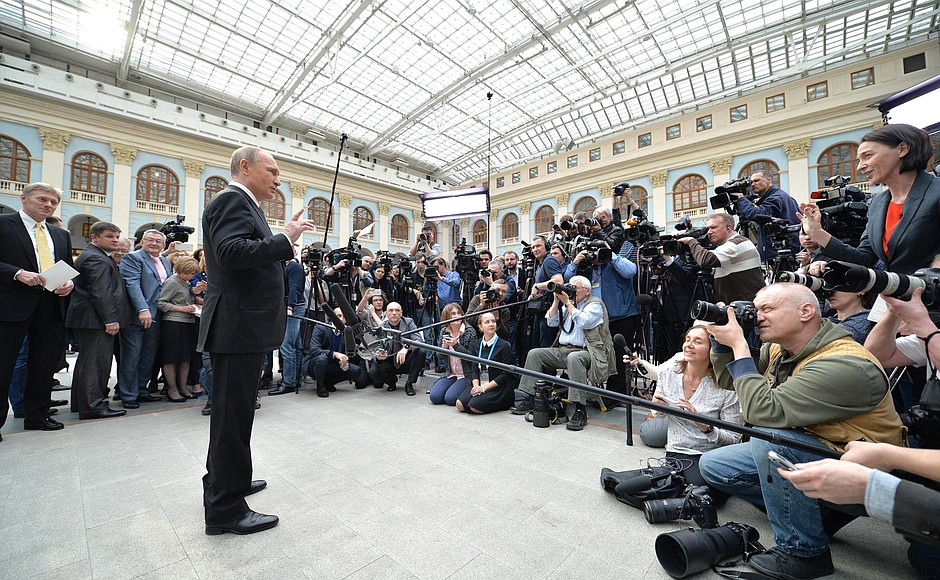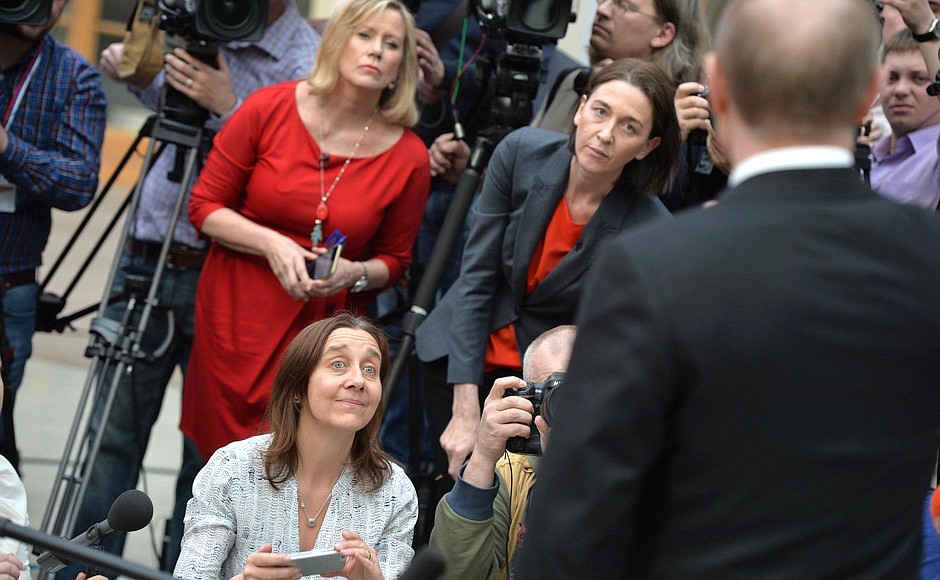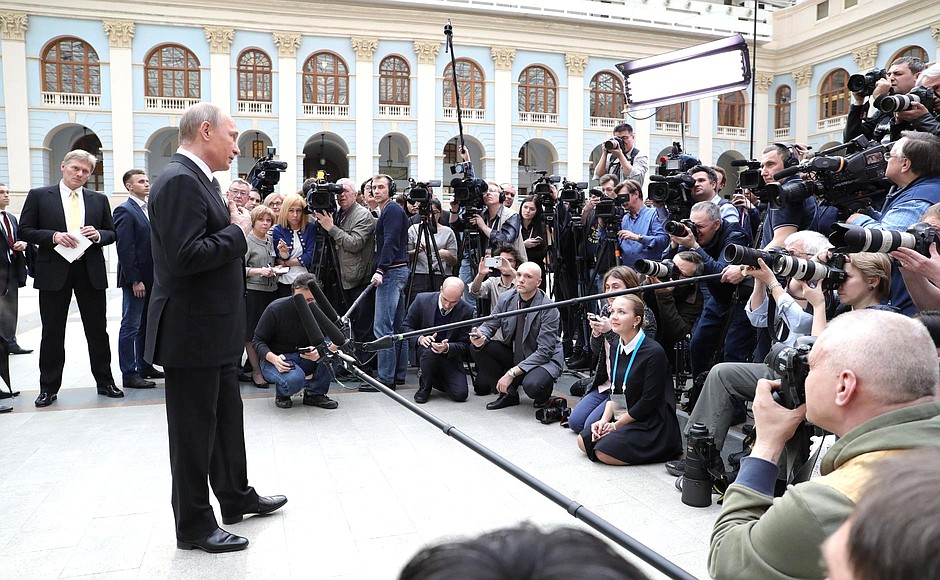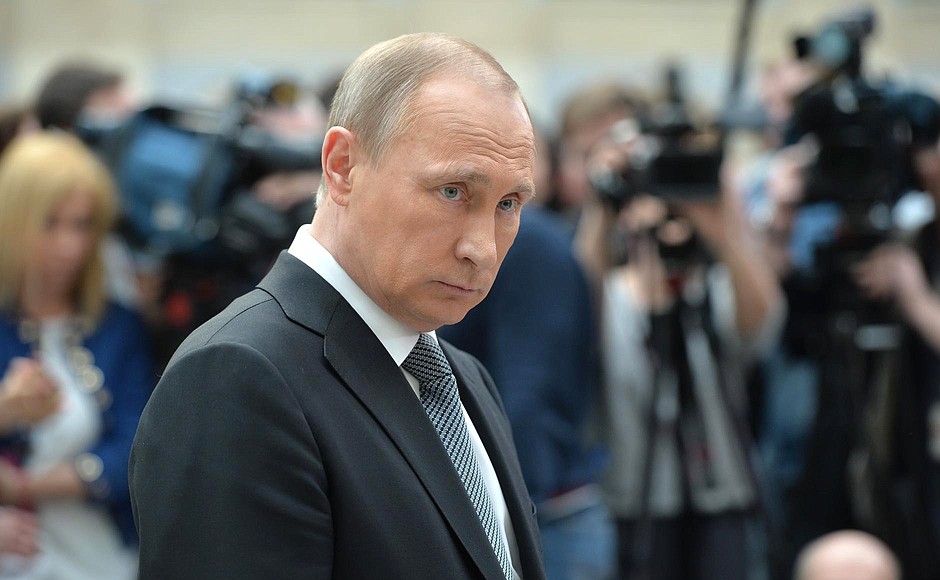Answers
to journalists’ questions following the Direct Line
Vladimir
Putin met with journalists and answered their questions following
the Direct Line.
April 14, 2016
16:00
Moscow

2 of 4
Answers
to journalists’ questions following the Direct Line.
Question: Was
it not daunting to face so many serious problems and pressing
questions?
President
of Russia Vladimir Putin: No.
Question: Why
do you say that?
Vladimir
Putin: This is my work, what my colleagues and I are
expected to do. You can’t hide from serious questions, because if you try
to put a gloss on reality, how will you understand what is
really going on? And it is extremely important to understand where we
are, how we are working, and how people view our work.
Question: Mr
President, when you were asked about [Alexei] Kudrin, you started talking about
the future, about some plans for 2018. Does this mean that you have
already made the decision to run for president in 2018?
Vladimir Putin:No, it doesn’t mean that I have made such a decision. It
means that we need to adjust our medium and long-term plans. No
country can survive without making such adjustments, and Russia is no exception.
We had development plans in place through to 2020, and now it is
already 2016. We have come to the point where we need to reflect
on the medium-term prospects.
This was Mr
Kudrin’s own initiative too, really. He and some other colleagues said
that we should be working on this regardless of who will be
in the Government and who will be the President.
The country has to know which road it is taking, at what pace,
and what is needed to reach the goals it has set.
Question:
Do you regret Obama’s imminent departure?

Vladimir
Putin: We will all go one day – there is no point in having regrets,
we have to work. I must say that the President
of the United States – assessments can vary of course, but
in any case his work should be assessed by the citizens of the US –
but he is working, and very actively. He and I keep
in touch, I maintain contact with his Administration,
and I am confident that this will continue until the end
of his tenure. He is a very responsible man. But once America elects
a new President, we’ll start working with the new one.
Question:
New government in Canada and new Prime Minister. How do you see
the relations with Canada going forward?
Vladimir Putin: We are positive about them. We have known each other personally since we
met in Antalya, by the way, at the G20 meeting. He has
expressed his views about how he is going to build relations with Russia.
We are quite satisfied.
As I understand
it, the new Prime Minister of Canada wants to build relations
with Russia on a positive basis, as we did in previous
years. We are fine with that. We are neighbours across the Arctic Circle,
across the North Pole. We have a lot of mutual interests, oddly
enough, even being as far apart geographically as we are. We look
forward to working together.
Question:
How do you see the role of the Kurds against ISIS?

Vladimir Putin: The role of the Kurds? What can I say? I will
just say it as it is. How do I see it? The Kurds are very
courageous people, if not heroic. I know what I am saying.
The Kurds fight selflessly, without sparing themselves, and very
effectively. They are a very serious force in the fight against
terrorism in the Middle East, particularly in Syria.
As you
know, the United States is working with them actively, but our troops are
also in contact with armed Kurdish units, including in Aleppo, where
the terrorists of Jabhat al-Nusra and ISIS are now trying
to oust them from their present positions. We are following
the events and we will support them.
Question:
You have mentioned the economy. What do you see as a way out
of this grave economic crisis: implementing Kudrin’s programme or,
for example, agreeing with Saudi Arabia to freeze oil output?
I also
have a question on privatization. Why did you agree
to the privatization of important stakes in companies like
Rosneft while the market is so low? How can you guarantee that it would
not become a replica of the loans-for-shares auctions
and selling off state assets at a low bargain price?

Vladimir Putin: Regarding ways out of the current situation, I do not
intend to use either what Alexei Kudrin is proposing, or any
agreements with Saudi Arabia as a foundation. In this respect,
we should be guided by the anti-crisis plan of the Russian
Government and make sure that it is implemented.
When it
comes to dealing with the situation in which Russia has found
itself, which is by the way also true for many other countries,
especially the developing economies, two or three areas should always
be prioritised.
What are
these areas? Attracting investment, raising the purchasing power, which
means increasing demand, and enhancing economic and governance
efficiency.
For that,
we need to support specific industries that are facing hardships. This
goes for the automobile industry, processing, agriculture should be
on this list anyway, which is due to sanctions and retaliatory
measures, as well as a number of other industries. They are
all mentioned in the Government plan.
There is no
doubt whatsoever that we need to ensure and increase the demand.
How? We need to assist people in difficult straits. We also need
to boost industrial demand through targeted support measures that
I have mentioned, including, by the way, the construction
industry, despite the fact that 85 million square metres of real
estate were built last year, as I have mentioned.
We need
to continue to balance macroeconomic and budget policies,
keeping the budget deficit within 3 percent and giving more political
and economic freedoms to businesses, as well as improve
the business climate.
These are
the five key areas that we must and will work on. It is on these
areas that we should base our efforts to foster economic development. We
need to put the country back on the track of steady
economic growth. We can and will do it based on the Government’s
anti-crisis plan.
As for privatisation,
there is nothing unusual in this respect. If you look
at the articles I published in the run-up
to the 2012 presidential election, I wrote that privatisation
could be supported, including in the oil and gas sector, which refers
to major state-owned companies. So there is nothing unusual.
Why are we
doing it on a falling market? First, we need money. Second
and most importantly, we will be looking for a strategic partner
who understands that skimping is not an option when it comes
to buying a 19 percent stake in Rosneft. There is no need to pay
attention to the current stock prices. We should be forward-looking.
If we find a partner of this kind, and I think that it is
possible, we will be ready to move ahead with privatisation despite
a falling market, as you have said.
Thank you.
<…>
Question: You
did talk about the economy, but could you tell us, do you place greater
hopes for recovering from this serious economic crisis on Kudrin’s
programme, for example, or on the agreement with Saudi
Arabia on freezing oil production levels?
And on the privatisation
issue, why have you decided to go ahead with the privatisation
of large stakes in companies such as Rosneft when
the market is at such a low point? In this situation, how
can you guarantee that we will not see a repeat of the old loans
for shares scheme or privatisation by agreement at low
prices?
Vladimir Putin:Concerning how we will bring about recovery from this crisis,
I am not going to base myself either on Mr Kudrin’s proposals,
or on agreements with Saudi Arabia. Here, we need to follow
the Government’s anti-crisis plan and make sure it is implemented.
Countries
that find themselves in a situation like that we face right now,
and this is the case of many countries, especially developing
markets, always put the emphasis on two or three main areas.
These areas
are attracting investment, raising consumers’ purchasing power, increasing
demand, in other words, and making our economy and overall
government more effective.
To do
this, we need to help particular economic sectors that have fallen
on hard times right now. They include the automotive industry,
processing sectors, and agriculture. I am referring
to the difficulties brought about by the sanctions,
counter-sanctions and so forth. All of these support measures are set
out in the Government’s anti-crisis plan.
We
absolutely must increase and guarantee demand. How will we do this? We
will provide assistance to the population groups facing difficulties,
and we will ensure production demand through targeted support programmes.
I spoke about these programmes, including the ones for housing
construction, despite the fact that 85 million square metres of new
housing were built last year.
We must
continue to follow a balanced macroeconomic and budget policy,
keep to a budget deficit of no more than 3 percent,
and continue to expand political and economic freedom
for business and generally improve the business climate.
These are
the five main areas in which we will continue to work. It is
this that will form the base for our hopes for successful economic
development. We must set the country back on a stable growth
track, and we can and will do this on the basis
of the Government’s anti-crisis plan.
As for the privatization
situation, there is nothing unusual here. If you look back
at my election campaign articles from 2012, you will see that
I said back then that I think it possible to support
privatisation, including in the oil and gas sector and with
regard to large companies with a state stake. So there is nothing new
here.
As for why
we are doing it when the market is down, first of all, we need money,
and second, this is not the biggest consideration. More important is
that we will look for a strategic partner who understands that there
is no point in being stingy if you are buying, say, 19 percent
of the shares in Rosneft. We want someone who realises that they
should be looking not at today’s prices, but at what the future
holds. If we find such a partner, and I think this is possible,
despite the falling market, we would be willing to go ahead with
privatization.
Thank you.






No comments:
Post a Comment